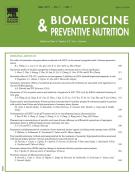Evaluation of the antioxidant and anti-inflammatory nature of luteolin in experimentally induced hepatocellular carcinoma - 06/06/12
Abstract |
Hepatocellular carcinoma is the sixth most common cancer worldwide but because of very poor prognosis, it is the third most common cause of death from cancer. There are currently limited therapeutic regimens available for effective treatment of this cancer. Luteolin is an important flavonoid with a potential anticancer effect. Luteolin usually occurs in its glycosylated form in celery, green pepper, perilla leaf, and camomile tea, etc., and much as an aglycone in perilla seeds. The present investigation was carried out to evaluate the antioxidant and anti-inflammatory nature of luteolin on N-nitrosodiethylamine (DEN) induced HCC in male Wistar albino rats. Enzymatic antioxidants, such as superoxide dismutase (SOD), catalase (CAT), glutathione peroxidase (GPx) levels were determined in the experimental rats. The levels of enzymatic antioxidants decreased, when subjected to DEN induction. These altered enzyme levels were ameliorated significantly by administration of luteolin at the concentration of 0.2mg/kg. b.wt. Mast cells play an important role in the inflammatory component of a developing neoplasm which is involved in invasion and angiogenesis. DEN administered rats showed increased mast cell density (MCD) as revealed by toluidine blue staining. Luteolin treatment inhibited this increase in MCD, thus, luteolin exerted beneficial effects on liver carcinogenesis by attenuating the recruitment of mast cells.
Le texte complet de cet article est disponible en PDF.Keywords : N-nitrosodiethylamine, Hepatocellular carcinoma, Luteolin, Mast cell, Anti-inflammatory activity
Plan
Vol 2 - N° 2
P. 86-90 - avril 2012 Retour au numéroBienvenue sur EM-consulte, la référence des professionnels de santé.
L’accès au texte intégral de cet article nécessite un abonnement.
Déjà abonné à cette revue ?


